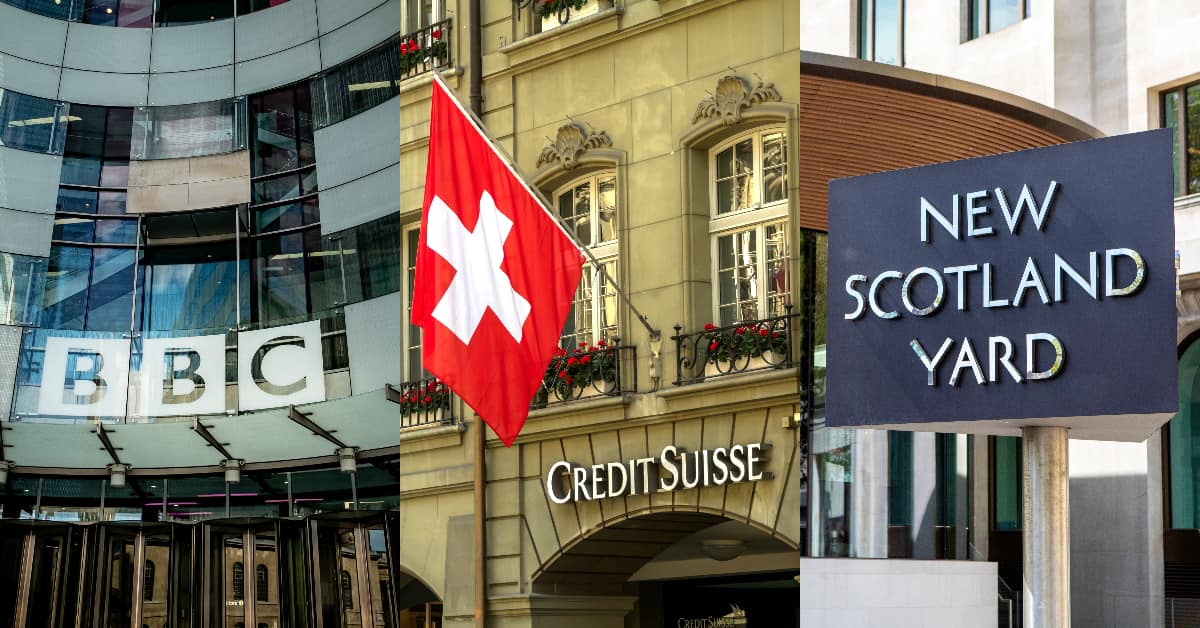
This is not a trick question. But what do the Metropolitan Police, Credit Suisse and the BBC all have in common?
Each have been involved in draw-dropping stories that have dominated the UK press in the last couple of weeks that are unsettlingly starting to feel like a pattern rather than a series of isolated incidents.
The first is possibly the most explosive. The Met Police have been thrown into absolute turmoil and utter disgrace with the publication of Baroness Casey’s report that has branded them as institutionally racist, sexist, and homophobic.
The damming indictment has been a long time coming. But it was brought to a head as a direct result of the murder of Sarah Everard by a serving Met Police officer and the woeful response of the organisation to accept that it was enabled by its own broken culture.
Although the Met has finally accepted there’s a systemic problem, they want to nit-pick about the word ‘institutionally’. The new Met Commissioner’s response to the report was to state that he’s not prepared to use that label. It struck me as an odd form of pedantry from an organisation that has just been outed as having lost the confidence of those it exists to serve.
Then there’s Credit Suisse. This is also the week when the financial markets have been rocked once again, this time at the near failure of the Swiss banking giant who admitted ‘material weaknesses’ in its financial controls. Yes, that’s right – a bank with weak financial controls.
This came only a week after CEO Ulrick Koerner told Reuters “We fulfil and overshoot basically all regulatory requirements”. All except the one about not sinking the bank, it turns out. It was subsumed into its arch-rival UBS over the weekend, to save it from total collapse.
If this is starting to feel like a catalogue of errors, bear with me a bit longer so I can bring the BBC into the story.
If you’ll pardon the pun, they scored a stonker of an own goal by suspending Match of the Day presenter, Gary Lineker for Tweets he posted about his disgust at the UK Government’s policy on the rights of refugees and asylum seekers.
The BBC invoked its impartiality clause in Lineker’s contract only to have the tables turned on itself for its blatant hypocrisy given the lack of political neutrality in the appointment of its Chairman. Richard Sharp got the job right after fixing-up the then Prime Minister, Boris Johnson, with an £800k loan from a distant cousin. Neither him nor the conservative Director General seem to get the obvious inconsistency and neither is prepared to resign over the matter.
What’s going on here?
As I watched each of these stories unfold there was a similarity in the way the leaders of these institutions tried to justify, diminish or excuse their behaviour. The response to the crisis may have displayed personal arrogance from the leaders themselves, but even more stark was the Institutional Arrogance that must be prevalent in each corporation for the circumstances to exist where these situations could be allowed to arise and continue.
What makes for Institutional Arrogance? I’ll explore the conditions that are consistent across the 3 examples above.
They think they’re great
Most notably, is the disparity between what the organisation thinks of itself and what the rest of us think of it. In the case of the Met, Baroness Casey noted that they hold an internal belief that they are “the best police force in the world” whilst the people they serve think they’re dire.
Rather than explore why the media and the public hold them in such low regard, the Met thought everyone else was wrong. This led them – previously – to be slow to react to criticism and – currently – to nit-pick; such as in their refusal to accept the report’s labelling of the issue.
They’re oblivious to their weaknesses and flaws
Organisations are Institutionally Arrogant when they seem oblivious to their obvious weaknesses. A school child would have been able to predict that the BBC were on shaky ground invoking sanctions on presenters for issues of impartiality when it so obviously has political appointees at its very top.
And the rules were applied inconsistently. Alan Sugar, a Conservative Peer and presenter of The Apprentice has been notoriously outspoken on matters of politics with no BBC sanction. To not see these inconsistencies shows staggering hubris at the top of the BBC.
There’s complacency throughout
In the case of Credit Suisse when working on the bank’s recent rights issue, Bloomberg noted that “senior executives seemingly sat back even as the bank’s share plummeted”. Complacency may be baked-in when a bank thinks it’s ‘too big to fail’; even if it turns out they’re dead wrong.
For the Met, time after time they justified the heinous behaviour of some of their rank-and-file officers as a case of a ‘few bad apples’ rather than accept that there might be something bigger going on. “The organisation as a whole, especially through its leadership, its management tiers, its policies, systems and practices, allows, or causes, discrimination and abuse to occur and recur”, wrote Baroness Casey.
They don’t take advice on how to fix things
When the most obvious breaches come to the fore, the Institutionally Arrogant organisation tends not to take advice on how to fix it. Casey goes on in her report that the Met “talks up future actions as if they’re already implemented”, adding that “this tendency is most clearly noticeable in a tick box approach to critical reports, inspections, inquiries and other forms of scrutiny where bigger picture issues are broken down into individual actions”.
Within the BBC, rather than hear the clarion calls for a widespread look at issues of impartiality across the entire BBC system, it has decided to tinker with the impartiality clauses in its policies, seemingly missing the inherent deeper risk for this nationally important organisation.
What they say and do are at odds
The Met are about keeping people safe, upholding the law, ensuring citizens live in a free society. Yet inside the Met, they woefully didn’t uphold the legal and moral standards they expect outside of it.
In the BBC, issues of impartiality were randomly imposed on one sports commentator and not others. It was noted by the former editor of the Sunday Telegraph that such rules “only work if they are applied right across the board”. If leaders demand impartiality, in order to be credible, they have to be utterly beyond reproach in that area. Anything less is Institutionally Arrogant. At Credit Suisse, to simultaneously proport that their core purpose was to ‘build lasting value’ whilst simultaneously destroying that value is obviously also Institutionally Arrogant.
Three organisations. One civic, one public and one corporate. At the heart of their self-inflicted crises is, in part at least, Institutional Arrogance.
For such hubris to be challenged at the company level, the entire organisation must be dedicated to a culture of accountability, humility, and the centrality of fairness. If this were easy, everyone would do it.
It’s too late for Credit Suisse. Let’s see if there’s still time for the Met and the BBC.
By Jacqueline Conway…
Dr Jacqueline Conway works with CEOs and executive teams as they fully step into their collective enterprise-wide leadership, helping them transform their impact and effectiveness.
Jacqueline is Waldencroft’s Managing Director. Based in Edinburgh, she works globally with organisations facing disruption in the new world of work.

